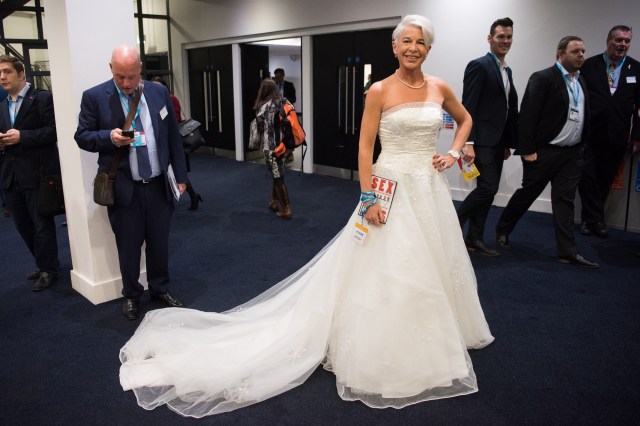Katie Hopkins wears her wedding dress to Conservative Party Conference. Matt Crossick/ EMPICS Entertainment.

Manchester Police, who must have better things to do, have invested vast resources this week so that the Conservatives can stage their annual conference in a city where the electorate has repeatedly told them that they are not welcome.
There are urgent questions demanding the ruling party’s attention–Brexit, housing, tuition fees, low productivity, the falling pound, and many more. The Prime Minister’s authority is threadbare. She may soon be sacked by her fellow Conservatives. But in Manchester, despite the expense, nothing will be settled.
The arguments for scrapping the whole expensive carnival, this season of late nights and heavy drinking, of freebies laid on by commercial lobbyists, and children accidentally conceived in hotel rooms when the Commons is dormant for three weeks, may seem strong. And yet something valuable would be lost to political life without it.
The annual conference of a governing party or potential party of government matters, for the insight it gives into the calibre of our would-be leaders. Sometimes, events in the apparent seclusion of a conference hall even reverberate outside.
At Labour’s annual conference in 1993, John Smith set himself the seemingly impossible task of persuading trade unions to cast their block votes in favour of a motion depriving them of the use of their block votes in future leadership elections. He succeeded by a hair’s breadth. Had he failed, he would have resigned forthwith. His successor would not have been Tony Blair.
Conservative annual conference can also make or break careers, despite there being no votes cast. When Michael Howard resigned the leadership in May 2005, the received wisdom was that the next leader would be David Davis, or possibly Ken Clarke, until David Cameron’s speech to the October annual conference suddenly put him out in front.
This year, the media bristled with quotes from unnamed ministers goading Theresa May to sack her Foreign Secretary. She would not be the first. Michael Howard sacked him from the opposition front bench; David Cameron refused to include him in the Shadow Cabinet. Boris Johnson’s roller-coaster political career must surely have come off the rails long ago but for his unique ability to wow the annual conference.
There is no better opportunity for a leader to establish dominance over the mass of rivalries and factions that make up a political party. Early in her premiership, Margaret Thatcher was setting a record as the most unpopular prime minister in polling history. The economy was in chaos, and half her Cabinet was in more or less open revolt. Against that background, she told the 1980 Conservative conference–“You turn if you want to: the lady’s not for turning,” a phrase that told the assembled representatives exactly what sort of leader they were dealing with.
At the opposite extreme, there was Iain Duncan Smith’s address to the 2003 conference, which was supposed to end the crisis enveloping his leadership. “The quiet man is back–and he’s turning up the volume” was its most memorable phrase. Supporters were primed to interrupt him almost two dozen times with ecstatic applause, including a nine-minute standing ovation, yet the whole performance fell flat. Before the month was out, he had been ousted.
Conferences speeches can be mind-rottingly dull and content-free, but anyone who thinks they are all in that category might profit from looking at the address to this year’s Labour conference by the Shadow Chancellor John McDonnell. Unequivocal promises to renationalise the water companies, railways, the grid, and Royal Mail, to take private finance iniative projects into public ownership, scrap tuition fees, and cut the deficit are all set out, in plain English. At a fringe, speaking to the like-minded, McDonnell went on to forecast that the election of a government led by Jeremy Corbyn might start a run on the pound.
There are performances that go down well in front of these self-selecting audiences, but suffer when they come up against political reality. I have not yet mentioned the conferences of the lesser parties, which matter greatly to their participants. It took the former Liberal leader David Steel many years to live down his instruction to his troops in 1981: “Go back to your constituencies and prepare for government!”
The head of Unite union, Len McCluskey, raised a wild cheer this year when he told the Labour delegates: “To those merchants of doom and whingers and whiners who say ‘We should have done better, we didn’t win’ I say this–We did win. We won the hearts and minds of millions…” We will see how that sounds when replayed in a few years.
Far be it from me to suggest that every memorable moment from a party conference reflects well on the politicians involved. The point is that they mattered. They would have mattered less in another context. Party conferences should not be ignored.










Join the discussion
Join like minded readers that support our journalism by becoming a paid subscriber
To join the discussion in the comments, become a paid subscriber.
Join like minded readers that support our journalism, read unlimited articles and enjoy other subscriber-only benefits.
Subscribe